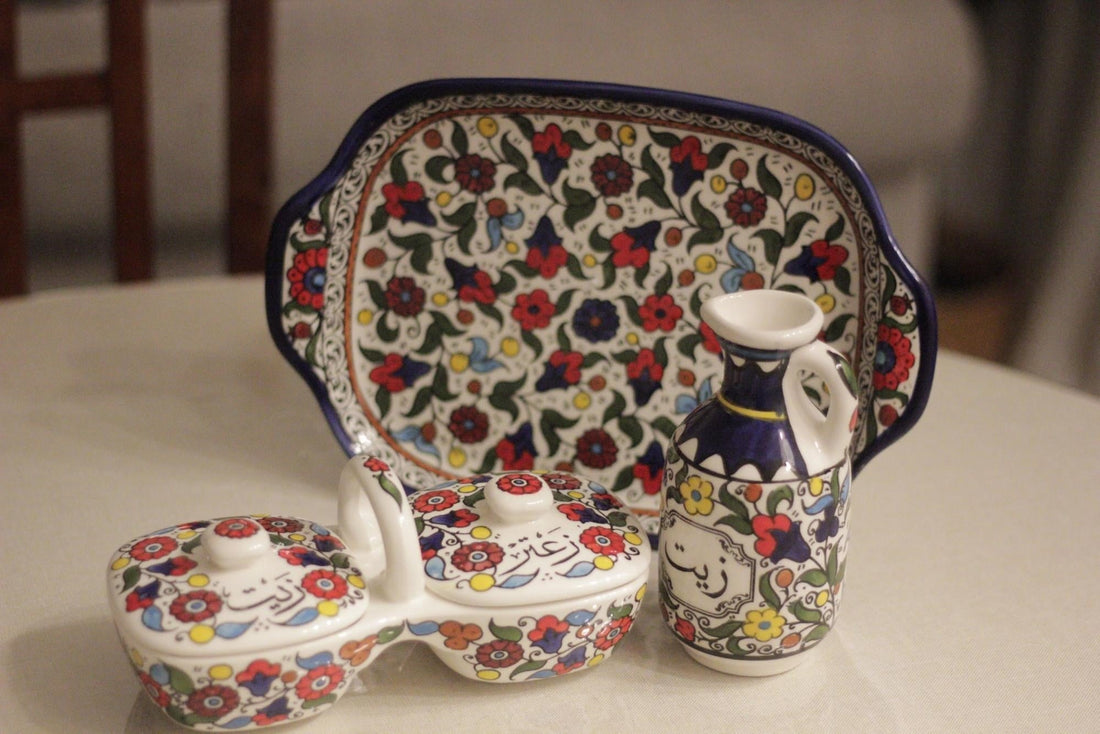Can Ceramic Trays Go in the Oven or Microwave? Tips on Usage and Care

Ceramic trays are a beautiful and functional addition to any kitchen. Whether you’re serving a fresh salad, baking vegetables, or simply adding elegance to your table, ceramics bring warmth, tradition, and style. But one common question many customers ask is: Can ceramic trays go in the oven or microwave? The short answer is: it depends. In this blog, we’ll break down what you need to know about safely using ceramic trays in ovens and microwaves, along with tips for proper care.
1.What Are Ceramic Trays Made Of?
Ceramic trays are made by shaping clay and then firing it at high temperatures in a kiln. The process creates a hard, durable material that can withstand heat, but how much heat—and how suddenly it’s applied—matters a lot. Not all ceramics are created equally. Some are meant purely for serving, while others are oven-safe and can handle high cooking temperatures.
At Watany Palestinian Products, our ceramic collection includes traditional Palestinian pieces crafted in Hebron, also known as Al Khalil ceramics. These trays are handmade and hand-painted, reflecting centuries of cultural artistry. But it’s important to know how to treat them to keep them safe and beautiful for years.
2.Are Ceramic Trays Oven-Safe?
Some ceramic trays are indeed oven-safe—but only if they were specifically made to withstand high oven temperatures. Here are some signs your ceramic tray might be oven-friendly:
- It’s labeled “oven-safe” on the bottom or in the packaging.
- It has no metal or plastic parts.
- It feels dense and solid, not light or overly delicate.
However, even oven-safe ceramics can break if exposed to thermal shock. This happens when a tray goes from cold to hot (or vice versa) too quickly. For example, taking a cold tray from the fridge and putting it directly into a hot oven can cause cracks or even breakage. Always allow the tray to come to room temperature before heating.
3.Can Ceramic Trays Go in the Microwave?
In most cases, ceramic trays without any metallic accents can go in the microwave. However, it’s always important to check. Some traditional handmade ceramics may have glazes or decorations that contain small amounts of metal or minerals that could react in the microwave.
Here’s how to test your tray:
- Put the ceramic tray in the microwave alongside a cup of water.
- Heat it for one minute.
- If the tray stays cool and only the water gets hot, it’s microwave-safe.
-
If the tray gets very hot, it’s not suitable for microwave use.
When using Palestinian ceramic trays from our collection, we recommend using them for serving, storing, or reheating—not for cooking in the microwave unless otherwise stated.
4.Usage Tips: Do’s and Don’ts
To keep your ceramic trays in good condition, follow these practical tips:
Do:
- Hand wash your ceramic trays with mild detergent and warm water.
- Dry thoroughly before storing to prevent moisture buildup.
- Use them to serve hot and cold dishes (once they are at room temperature).
- Handle with care, especially if they are hand-painted or glazed.
Don’t:
- Don’t put them in the dishwasher if they are hand-painted—it could damage the design.
- Don’t expose them to sudden temperature changes.
-
Don’t use them over direct flame or stovetop burners.
5.Caring for Traditional Palestinian Ceramics
Al Khalil ceramics are known for their vibrant colors and traditional designs. These handmade pieces are more than functional—they’re art. Each tray is hand-painted, making every piece unique. While durable, these trays deserve gentle care.
Avoid abrasive sponges when cleaning. Instead, use a soft cloth or sponge. If any food is stuck, soak the tray briefly in warm water. Never soak for too long, especially for older or vintage pieces, as water can seep through tiny cracks in the glaze over time.
Displaying your tray as part of your home décor when not in use is also a lovely way to keep it safe while enjoying its beauty.
6.Why Choose Ceramic Trays?
Ceramics retain heat well, making them perfect for keeping food warm. They also add elegance to your table, especially when using traditional Palestinian ceramics. Whether you’re serving maqluba, fresh fruit, or roasted vegetables, a ceramic tray elevates the experience.
Additionally, ceramic is non-toxic, lead-free (if made under proper standards), and eco-friendly. Unlike plastic or metal, it doesn’t react with acidic foods and adds no unwanted flavor.
Final Thoughts
So—can ceramic trays go in the oven or microwave? In many cases, yes—but always check the labeling and avoid sudden temperature changes. When in doubt, use them for serving rather than cooking.
At Watany, we take pride in offering authentic Al Khalil ceramics that honor Palestinian craftsmanship. Browse our ceramics collection to find trays, bowls, and serving dishes that combine function, beauty, and heritage.
Whether you're hosting a traditional Palestinian meal or gifting a piece of culture to a loved one, ceramic trays bring timeless charm to any setting. Treat them with care, and they’ll serve you beautifully for years to come.
